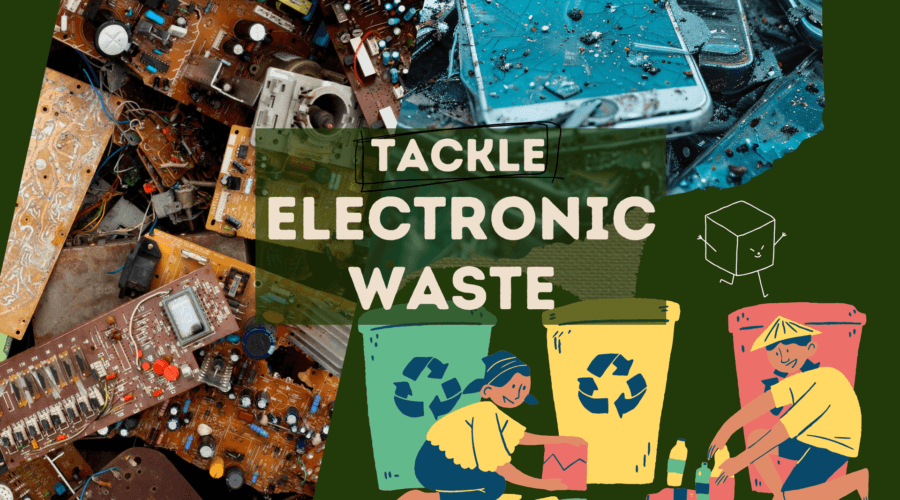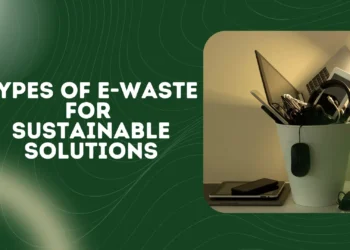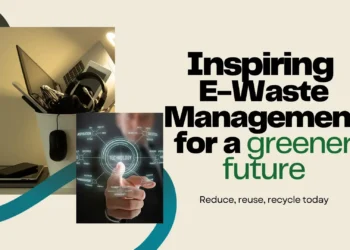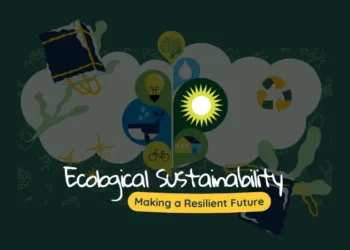Have you ever thought about what happens to your old mobile phones, laptops, or broken…

7 Powerful Solutions to Tackle Electronic Waste in India for a Sustainable Future
Electronic waste in India is a big problem that needs to be fixed quickly. It includes things like old computers, phones, TVs, and other gadgets that people throw away. In India, the rapid growth of technology has indeed made life easier, but it has also led to a serious problem—electronic waste. Every year, India churns out millions of tons of e-waste, which either ends up in landfills or is processed in unsafe ways.
Why is this a problem? E-waste has dangerous stuff like lead, mercury, and cadmium that can hurt the environment and make people sick if not taken care of properly. But e-waste also has valuable things like gold, silver, and copper that we can reuse by recycling. This means managing electronic waste in India is not just about reducing harm but also about creating opportunities.
This article will explore seven robust solutions to this growing problem and pave the way for a sustainable future.
Current State of Management of Electronic Waste in India
India is one of the largest producers of electronic waste in the world. The rapid increase in technology use and short product lifespans have worsened the problem. According to recent reports, India generates more than 3 million tons of e-waste annually. Unfortunately, most of this waste is not managed correctly.
Only a small percentage of electronic waste in India is recycled through authorized channels. Instead, the informal sector handles much of it. Workers often don’t have the right tools or enough knowledge to handle electronic waste in India safely. This puts them in danger of coming into contact with harmful chemicals and also leads to pollution. India needs better ways to deal with this big problem.
Seven Powerful Solutions to Tackle Electronic Waste in India
- Implementing E-Waste Recycling Programs: The first step to managing electronic waste in India is to set up proper recycling programs. Recycling is like a ray of hope for solving the electronic waste problem. It means breaking down old gadgets to recover useful materials like metals. Special recycling centers use advanced methods to safely remove harmful substances and collect valuable metals. One great example is Attero Recycling, India’s biggest e-waste recycling company in Uttar Pradesh. They use smart technology to take out precious metals like gold and copper from old electronics. This shows how recycling can help the environment and create jobs and business opportunities. For recycling to work well, the government and private companies need to work together. Setting up more recycling centers and making them easy for everyone to use is a big step towards solving India’s electronic waste problem.
- Promoting Awareness and Education Campaigns: Most people in India don’t know how dangerous electronic waste can be or how to get rid of it the right way. It’s very important to teach everyone about this problem to reduce e-waste pollution. Awareness programs can help people understand why throwing away e-waste is harmful and show them how to recycle or donate their old gadgets instead. The E-Waste Awareness Program by the Ministry of Electronics and Information Technology (MeitY) has been running campaigns to inform people about e-waste management. Schools, colleges, and community groups can also play a significant role by organizing workshops and programs. Simple messages like “Don’t throw your old gadgets in the garbage—recycle them instead” can really help people change their habits.
- Encouraging Manufacturer Take-Back Initiatives: Companies that make electronic gadgets can help a lot with the e-waste problem. Some companies now have “take-back” programs, where people can give back their old gadgets to be recycled. This makes it easier for everyone to get rid of e-waste in a safe and proper way. Big companies like Dell and Apple have started programs in India to take back old gadgets. For example, Apple has a trade-in program where you can give them your old devices and get a discount on new ones. These programs make it easier for people to recycle and even offer rewards for doing so. If all electronics companies are required to have take-back programs, it can help reduce the problem of electronic waste in India and protect the environment.
- Government Policies for E-Waste Management: The government has an important job in making rules to manage electronic waste in India. In 2016, India started the E-Waste Management Rules. These rules say that companies must take care of safely disposing of their old products. But, the rules need to be followed more strictly to work better. Cities like Bangalore are already following stricter rules to collect and recycle e-waste in the right way. The government must also support local e-waste recyclers through financial assistance and technical training. Clear policies and strict monitoring will ensure that individuals and companies manage e-waste responsibly.
- Innovative Technologies for E-Waste Processing: Technology can help us find new ways to deal with electronic waste in India. Special methods like breaking down e-waste to take out useful materials, such as metals, can be done safely without hurting the environment. These methods also make it quicker and easier to handle e-waste. In Pune, a company named Ecoreco has made special mobile units to recycle e-waste. These units can travel to different places and recycle e-waste right there. This is very useful for areas that don’t have recycling centers nearby. Using such smart technologies can completely change how India handles its electronic waste and make it much better for the environment.
- Community Involvement and Local Solutions: Communities, including you, can play a significant role in managing electronic waste in India. Local initiatives like e-waste collection drives, which you can be a part of, can encourage people to dispose of their gadgets responsibly. Schools, colleges, and housing societies, with your active participation, can collaborate to set up e-waste collection points. In Hyderabad, NGOs like SAAHAS have organized community programs to collect e-waste. They work with authorized recyclers to ensure the collected waste is processed safely. Such programs reduce pollution and create awareness at the grassroots level. Encouraging local solutions can make e-waste management more effective and inclusive.
- Importance of Sustainable E-Waste Solutions: Taking care of electronic waste in India isn’t just about recycling—it’s about building a system that works well for the future. This means making gadgets that last longer, only upgrading them when really needed, and using materials that are safer for the environment. Some companies are already doing this in a smart way. For example, they design gadgets with parts you can replace if they break. This way, you don’t have to throw the whole device away, which helps reduce waste. If we try to be careful and sustainable at every step—when making, using, and getting rid of gadgets—India can solve a lot of its e-waste problems and make the world a cleaner, better place to live.
Conclusion: A Sustainable Future Awaits
Taking care of electronic waste in India isn’t just about recycling; it’s about making a system that works better for the future. This means building gadgets that last longer, only upgrading them when really necessary, and using materials that are safe for the environment.
Some companies are already doing this in smart ways. For example, they make gadgets with parts you can replace if they break. This way, you don’t need to throw the whole device away. It helps reduce waste and protect the planet.
If we make smart choices at every step—when making, using, and getting rid of gadgets—India can cut down on electronic waste and help make the world a cleaner and greener place.
Everyone has a role, from individuals and communities to businesses and the government. By working together, we can reduce the harm caused by electronic waste and create a healthier, more sustainable India.
Let’s take action today for a cleaner tomorrow!




Comments (0)